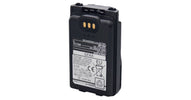
Mistakes That Shorten Your Icom Radio Battery Lifespan
, by Jesus Moraga, 5 min reading time

, by Jesus Moraga, 5 min reading time
Reliable two-way radios require consistent power from dependable batteries. Professionals in many industries have unknowingly made everyday mistakes that shorten the lifespan of their radio batteries.
Recognizing these habits and making a few adjustments can enable your batteries to perform longer so your Icom radios are ready when you need them. This guide outlines the common mistakes that shorten your Icom radio battery lifespan and provides practical steps to avoid them.
Leaving a battery connected to the charger after it’s fully charged might seem harmless, but it gradually wears down the battery’s internal components. Overcharging produces heat, and excess heat damages battery cells over time. This damage reduces the battery capacity and causes inconsistent performance.
To keep battery life strong, disconnect the battery once it reaches a full charge. Many Icom chargers feature automatic shut-off, but it’s still better to monitor charging times and unplug as soon as charging is complete.
Using a charger that isn’t an exact match for your radio can damage the battery. Non-designated chargers often deliver power inconsistently, which puts stress on the battery cells and creates safety risks due to overheating or short-circuiting.
Only use chargers that are designed for your radio model. Icom-approved chargers maintain a stable current and work with the Icom battery’s specifications. Sticking with compatible chargers extends the battery’s operating life and supports safe use.
Batteries don’t respond well to temperature extremes. High heat can cause swelling or leakage, while freezing temperatures can weaken a battery’s ability to hold a charge. Leaving radios inside hot vehicles or storing batteries in unheated environments during winter shortens their functional lifespan.
Store batteries in a cool, dry, temperature-controlled space. Avoid leaving batteries in direct sunlight, near heating vents, or in damp conditions. These simple precautions maintain battery performance and reduce the chance of permanent damage.

Frequently allowing a battery to drop to zero creates long-term wear. While it may seem efficient to drain the battery completely before charging, modern lithium-ion batteries don’t require full depletion.
Regularly charging before the battery dips below 20 to 30 percent reduces internal stress. Unlike older battery types, modern batteries don’t suffer from the “memory effect,” so partial charges are perfectly safe and even recommended.
Routine care matters, as dirty battery contacts reduce the effectiveness of charging and may disrupt communication in the field. Dust, grime, or corrosion on the terminals blocks energy flow and reduces performance.
Inspect battery contacts regularly, and clean them with a dry, soft cloth. Never use water or harsh cleaners. Also, check for visible signs of damage such as bulging, leaks, or discoloration. Remove damaged batteries from use, and replace them immediately.
Storing batteries at full charge or completely dead causes degradation over time. Letting a fully charged battery sit unused for weeks can lead to capacity loss. Likewise, storing a depleted battery increases the risk of permanent failure.
Store batteries at about 50 percent charge in a cool, dry location. Use plastic battery cases or padded containers to prevent damage. Avoid storing batteries in metal drawers or containers, as exposed battery terminals can cause short-circuiting.
Plugging and unplugging your charger often while charging a battery can shorten its usable life. Interruptions confuse the battery management system, making it harder for the battery to track and deliver consistent energy levels.
Try to charge the battery from start to finish without unnecessary interruptions. Waiting for a full cycle maintains battery integrity and supports more stable performance during use.
Generic or counterfeit batteries may seem like a cost-saving option, but they often fall short in safety, lifespan, and reliability. Many lack the protective features built into original products, putting users at risk of overheating, short circuits, and poor performance.
Stick with genuine batteries that match their radio models. For example, use Icom batteries for your Icom radios. Authentic Icom batteries follow strict quality standards that align with the radio’s energy demands. Investing in proper batteries supports long-term performance and minimizes risk during operation.

Even with high-quality equipment, battery longevity ultimately depends on user behavior and care. Small, consistent habits often make the biggest difference in preserving power and performance over time.
Beyond avoiding damaging behaviors, several additional steps will keep batteries working longer. Consider integrating the following habits into your battery care routine.
Cycle the battery occasionally. Every few months, let the battery run down to near empty (but not zero), then recharge to 100 percent. This helps the battery management system recalibrate and track capacity more accurately.
Adjust the radio settings to reduce power use. Lowering screen brightness, turning off unused features, and enabling power-saving modes reduce the energy draw on your battery. These adjustments lead to less frequent charging and a longer-lasting battery.
Label and rotate your batteries. If you’re managing a fleet of radios, label each battery with a number or name. Rotate their usage to avoid overusing the same battery repeatedly, which helps balance wear across all units.
Keep spare batteries at a moderate charge. When storing backup batteries, keep them at around 50 percent charge. Check them every few months, and recharge slightly if needed. This avoids both full charge stress and deep discharge damage.
Avoid overexposure to charging surfaces. Charging on uneven or unstable surfaces can cause poor contact. Always charge on a flat, clean surface to promote safe and efficient charging.
Poor battery habits can cut short the lifespan of even the best Icom radios. Avoiding the common mistakes that shorten your Icom radio battery lifespan will keep your communication equipment reliable and field-ready.
For dependable performance, choose genuine batteries for Icom radio models, and adopt maintenance routines that support longer-lasting power. Explore Atlantic Radio Communications’ selection of batteries and accessories, and contact our team for advice on getting the most from your communication equipment.